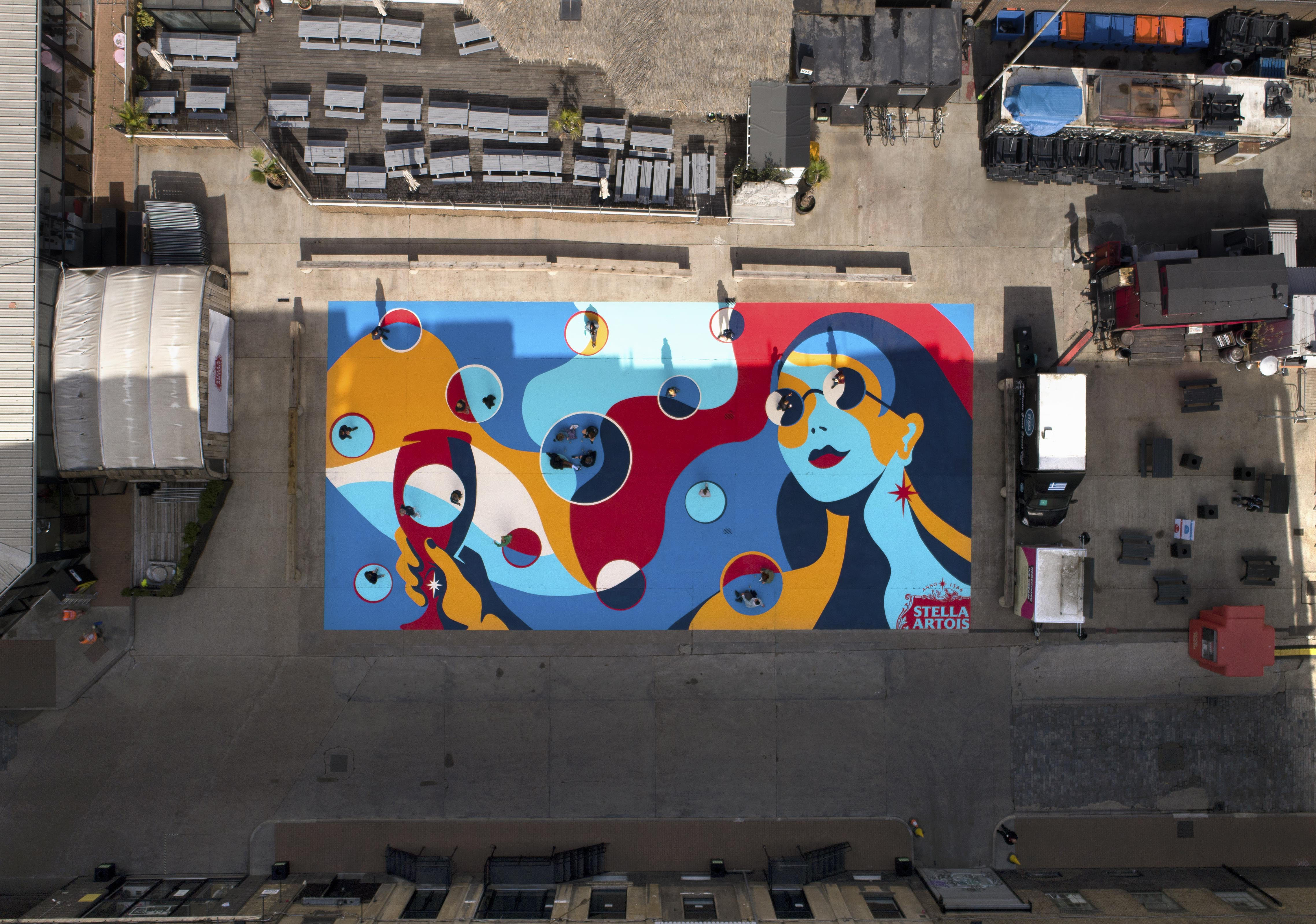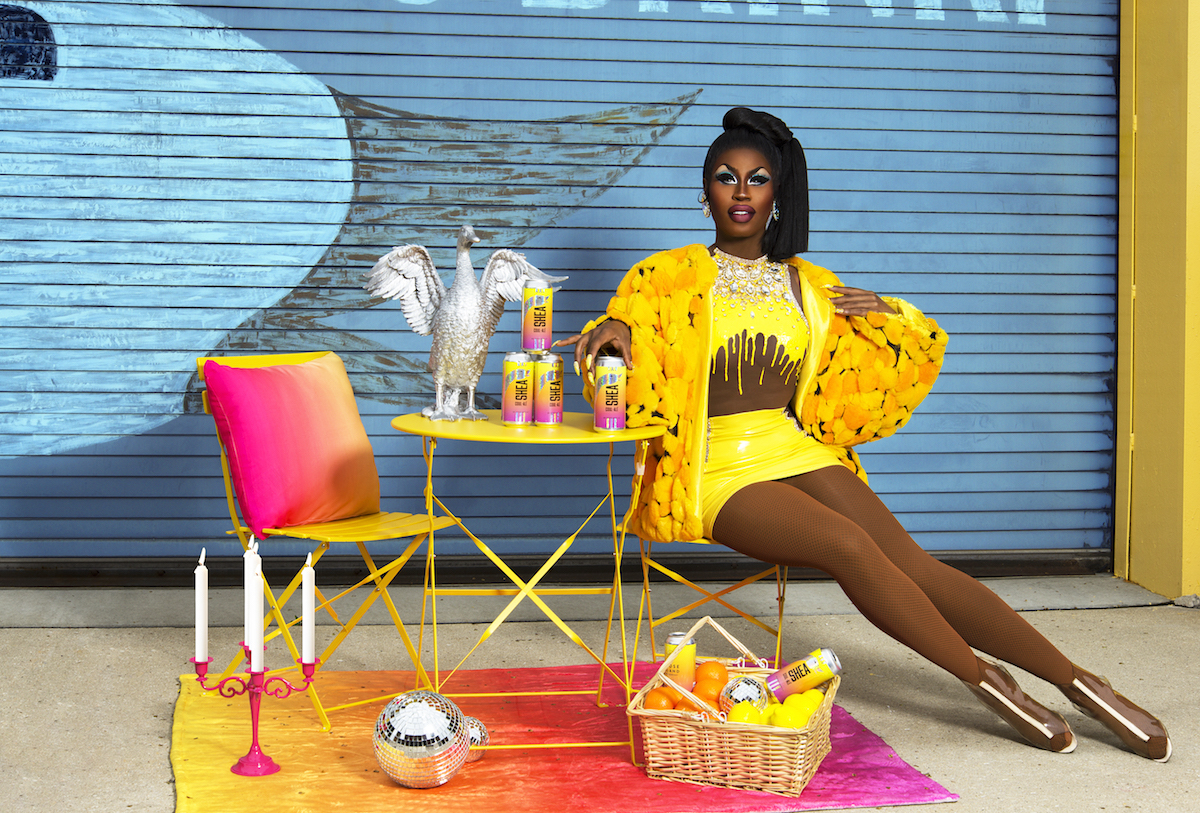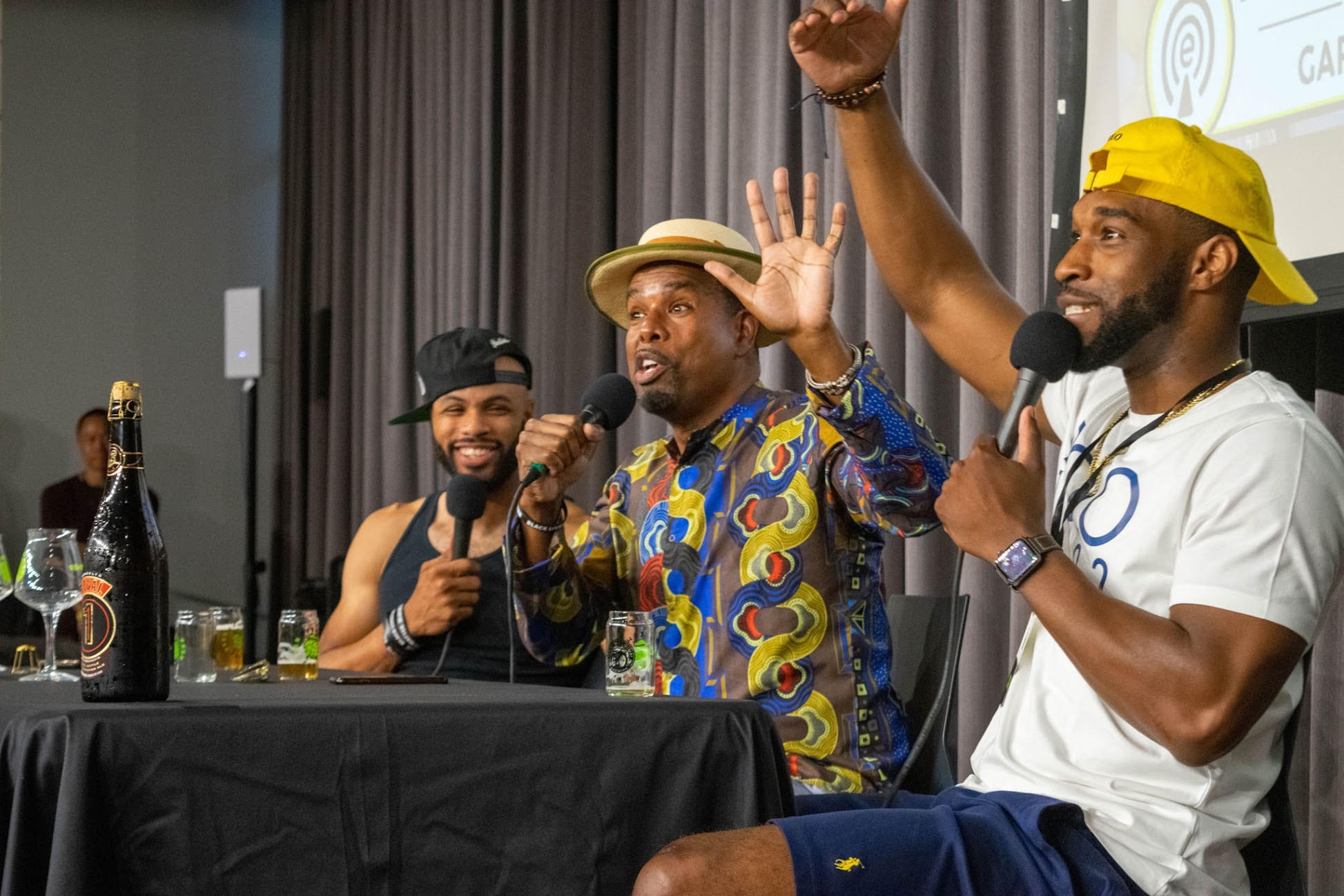
COVID continues. Therefore… so, too, does the need for caution. So, too, does the need for beer.
At least the latter is the conclusion of a 103-year-old woman who survived the virus. As multiple news outlets reported in late May, Jennie Stejna of Massachusetts was at the doorstep of death. Her family was even urged to say goodbye. When she survived, however, she asked the nursing staff for a Bud Light. In a photo that has now gone, well, ‘viral’, they treated her to one. What beer will you celebrate with when this is all over?
Drinking and taking caution are of course possible. Recently, global brand Stella Artois partnered with artist Shepard Fairey, famous for his Obama “Hope” art, to design a work that encourages drinkers to maintain a healthy social distance while enjoying their beer. As Fairey notes, artwork is much preferable to the ugly barriers, ropes, and plastic being used now to help people distance themselves. His design is a 28m x 14m colorful painting on the ground of London’s Truman Brewery that will apparently be shared. It features a woman holding up a chalice and bubbles where people can sit to enjoy their beverages. Customers become part of the art, though of course people drinking are always a work of art in their own way. Don’t ever forget you are a masterpiece with beer in your hand.

Using that as a segue… Chicago-based drag superstar and queer community advocate Shea Couleé partnered with local brewery Goose Island for a beer called Shea Coul-Alé. A portion of the proceeds go to support the organization Transtech, which assists trans women in job training and placement. The beer itself is a wheat ale with lemony character, perfect for summer, and it comes with it’s own slogan: “She’s here. She’s queer. And she’s a beer.” (Dear Transtech, we could use another English copy editor).
Industry folks and knowledgeable readers may have noticed that the beers noted above are brands owned by AB InBev, the transnational corporation that also owns Budweiser. The company has been in a trademark dispute with Czech-based brewery Budweiser Budvar over the Budweiser name since the early 20th century (the other Budweiser producer was established in St. Louis). Let’s just say the story is complex. Budvar, for its part, announced in June that both its output and revenue hit record numbers in 2019, with strong exports to several European countries. We’re guessing the two rivals aren’t going to be doing a collaboration beer any time soon. But 103-year-old Jennie Stejna might like to know if they do.
Some collaborations run into problems despite the best intentions. Earlier this summer, Swedish-based Omnipollo and UK-based Buxton Brewery partnered to produce a beer called Yellow Belly to denounce racism (the name means “coward” and refers to those who act anonymously while hiding behind a group identity). The bottle packaging features two eye holes as if cut out of a sheet or hood, to suggest someone hiding behind something… much like a Ku Klux Klan hood. A patron at a bar in America, where the beer was available, ordered the beer and got quite a surprise when ‘the hood’ came out–he’s black. Online indignation and outrage ensued. Others pointed out that the label on the back of the bottle clearly stated the beer’s anti-bigotry intent and that reactions were overblown. As businesses that have been burned before by such missteps would note, checking on potential sensitivities with naming, packaging, etc. is important when exporting, but we do salute the two breweries for having their hearts in the right place. Omnipollo is available in Japan, for those that want to show support by at least drinking a few of their beers–they’re quite good!
Another collaborative beer endeavor inspired by notions of social justice, but with better results, is the Black is Beautiful Beer. It’s similar to collaborations like Sierra Nevada’s “Resilience” (for Northern California fire relief) and the more recent “All Together” from Other Half Brewing (for industry workers affected by COVID). With both, the breweries released a base recipe that allowed other breweries to make slight alterations; breweries then sell under the shared beer name and donate a portion of the proceeds. Black is Beautiful is the brainchild of Marcus Baskerville, co-founder and brewer of Weathered Souls Brewing Co. of San Antonia, Texas.
The base recipe is a high-abv stout “to showcase the different shades of black”. At the time of this writing, over 1000 breweries in 20 countries had signed on to brew it. The brewery asks that participants donate to local organizations that support police reform, the defense of wronged individuals, or equality and inclusion in their local communities. In Japan, Kyoto Brewing Company (KBC) is participating in the project and will be donating to the “Legal Rescue Squad” run by the Kyoto Bar Association. As KBC’s website states, “This legal defense fund provides support for those seeking legal representation who otherwise may not have the means to afford it.” Thanks for helping out, KBC! Black is beautiful and so is fairness.

Against the backdrop of the contemporary social justice movement in America, Garrett Oliver, the brewmaster of Brooklyn Brewery, launched a foundation to support BIPOC (Black, Indigenous, People of Color) brewers and distillers. Called The Michael Jackson Foundation for Brewing & Distilling, it will provide technical education and career advancement opportunities, as well as scholarships. The organization will be open to citizens of the U.S. (including its territories and protectorates) as well as those with permanent resident status. Oliver, who has been a frequent visitor to Japan over the years, will serve a five-year term as the chair before turning over the reins to the next leader. As some might note, legendary beer scholar Michael Jackson, after whom the foundation is named, was not BIPOC. The website, however, cites the indebtedness of the beer community to his work, and that he was “actively and profoundly anti-racist”.
These are difficult times, folks. COVID, political unrest, social inequality… taxes. As we write, the Australian beer industry and consumers are trying to push back on a scheduled tax hike on beer, set to go in effect in early August. Aussies currently pay $2.26 per liter, which is fourth behind Norway ($3.46), Japan ($2.92) and Finland ($2.46), according to the Daily Mail (UK). The new proposed rate is $2.29. According to Australian law, the beer tax increases twice a year–and has been doing so since 1983–to keep pace with Consumer Price Index. While .03 doesn’t seem like a lot, imagine if that were added to everything you bought. It’s the principle, dammit! It’s time to push back in the Age of Covid! And as Brewers Association of Australia CEO Brett Heffernan noted, “Tax is the most expensive ingredient in Aussie beer.” Germany, by contrast, is $.13 per liter. Aussies, if you don’t get reprieve, take heart in this: it will still take you ten years at your rate of increase to reach Japan’s current levels.
So how much more will the tax hike make this new product cost in Australia: a 99-can beer carton. Pabst Blue Ribbon, an American macro brewery, released the limited edition package in Australia in June and we suspect it was a hit… if people could even fit it in their car. This is like Costco size taken to an extreme. It weighs 37kg and contains a total of 32,670ml of beer. The package was actually previously launched in Canada in 2017, then in America in 2019, as a limited edition “family pack”, which is bullshit of course because everyone knows this light lager is a cult favorite of hipsters (the brand has a similar underground following in Oz). But there is a more interesting backstory…
Pabst admitted they ‘borrowed’ the idea for a 99-pack from craft brewery Austin Beerworks (Texas), which released a 99-can pack in 2014 called Peacemaker Anytime Ale–it cost $99. The pack contained an extra pale ale that even won a silver medal at the Great American Beer Festival in 2011. Austin Beerworks was not happy with the appropriation and took to Twitter to voice its indignation. It also claimed on its website that it had been “99% pissed off”. The GM of Pabst, an Australian named Matt Bruhn (which might explain the brand’s move to Australia), called up the craft brewery to make amends. Not only did Pabst quickly credit the craft brewery for the idea, it also donated $9999.99 to the Central Texas Food Bank so impoverished Austin residents could enjoy a good meal that holiday season (it’s unknown if those meals included Pabst). Austin Beerworks acknowledged the civility with which the issue was resolved and joked on their Twitter account, “It’s impossible to be mad at anyone with an Australian accent.”
This article was published in Japan Beer Times # () and is among the limited content available online. Order your copy through our online shop or download the digital version from the iTunes store to access the full contents of this issue.



